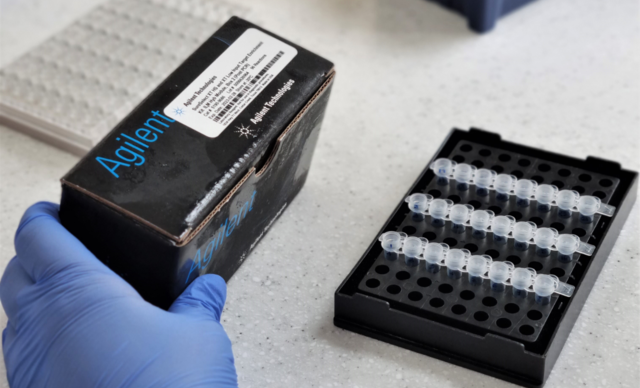Personalized medicine: Institut Curie and Agilent launch a breakthrough comprehensive genomic profiling kit for cancer

Launching this Curie-made product on the market illustrates why Institut Curie’s doctors, researchers and care staff pour so much creativity and commitment into the work they do: to develop tangible innovations that provide a solution to the scientific, technological and medical challenges that arise with cancer.
explain Prof. Alain Puisieux, Director of Institut Curie’s Research Center and Prof. Steven Le Gouill, Director of Institut Curie’s Hospital Group.
Over the past few years, precision medicine has emerged, sparking a rise in targeted treatment tailored to specific patient’s tumor profile. Following analysis of the tumor’s molecular characteristics, it leads to a better understanding and therefore treatment of the disease, and helps us predict how patients may respond and thus prevent any potential recurrence. The key to improving these personalized approaches lies in honing high-throughput sequencing[1] technology for increasingly precise results.
Institut Curie and Agilent have been working together since 2020 to develop a comprehensive genomic profiling sequencing tool for solid tumors. This partnership brings together Institut Curie experts in genetics and bioinformatics, and Agilent specialists in designing cutting-edge scientific instruments and tools. Recently put on the market by Agilent, the “SureSelect CD Curie CGP” kit is already being widely and routinely used within the Institut Curie Hospital Group.
A tumor ‘identity card’ for customized care
“SureSelect CD Curie CGP” sequences 571 genes involved in cancer to detect key genetic abnormalities — and all with a single, quick test. Mapping all a tumor’s mutations draws up an ‘identity card’ that serves as a boon for decoding the disease, collating invaluable information for diagnosis, prognosis, predicting response to targeted treatment, shedding light on genetic predispositions to cancer and involving patients in clinical trials.
Now for the first time, a sequencing tool is allowing us to map tumors on an incredibly comprehensive scale. We designed it with a view to answering all molecular questions that doctors might have with a view to improving diagnosis for complex tumors and offer each patient tailored care.
explains Dr. Julien Masliah-Planchon, team lead for the project at Institut Curie and an oncogenetics specialist practitioner at Institut Curie’s Diagnostic and Theranostic Medicine Division.
This kit provides data on complex biomarkers such as tumor mutational burden[2] (TMB) and microsatellite instability[3] (MSI), two emerging biomarkers used to predict how effective immunotherapy might be.
From lab to patient: an industrial partnership success story
“This kit wouldn’t have been possible without the collective efforts that brought together Institut Curie’s medical, biological and IT teams, and Agilent’s expertise. The company gave this project wings,” adds Dr. Masliah-Planchon. The genes of interest were selected by Dr. Masliah-Planchon and his team, while the IT pipeline used to interpret the results was developed by a team led by Dr. Nicolas Servant, Co-Director of Institut Curie’s Bioinformatics platform. Demonstration of the kit’s functionality was carried out in the SHIVA02 clinical trial, with the product used in routine practice as part of the molecular RCP[4] run by Institut Curie’s Department of Drug development and Innovation (D3i), headed up by Prof. Christophe Le Tourneau and coordinated by Dr. Maud Kamal.
We are happy to be incorporating Institut Curie’s panel of genes into our growing Community Design catalogue. The precision of the Agilent SureSelect XT HS2 target enrichment kits combined with the quality of capture probes synthesis help improve the results. We want as many people as possible to have access to this technology to ensure all markers of cancer somatic interest are detected in a single test. This Agilent and Institut Curie collaboration is paving the way for faster, more precise tumor mapping.
say Claude Revel and Francois Lozach, Market Specialist and Field Application Scientist at Agilent.
We are delighted this kit is being launched, in a move that will give many more hospitals access to this state-of-the-art technology. This is a striking example of why we champion a proactive industrial partnership and technology transfer policy, buoyed by our Carnot excellence label*: harnessing research to bring patients the most promising innovations as swiftly as possible.
explains Dr. Cécile Campagne, Director of Institut Curie’s Technology Transfer Office and Deputy Director of Carnot Curie Cancer.
*Comprehensive Genomic Profiling
**Comprehensive, as aligned with international recommendations issued by ESMO.
[1] High-throughput or next-generation sequencing (NGS) is a form of molecular technology that allows thousands to millions of DNA or RNA molecules to be sequenced quickly and simultaneously, by determining the unique and specific order inherent to nucleic acid data. This tool means multiple genes from multiple individuals can be sequenced simultaneously, with a patient’s sequence compared to a reference.
[2] Tumor mutational burden (TMB) is a promising new predictive biomarker used in immuno-oncology. By picking up on the quantity of mutations present in tumor cells’ DNA, it can predict how effective immunotherapy might be.
[3] Tumors where the MMR system (DNA mismatch repair proteins) is deficient build up mutations at microsatellite level, known as MSI.
[4] Drawing on tumor molecular characterization, Institut Curie’s molecular RCP sets out to channel patients with recurring or progressing metastatic cancer into a groundbreaking therapeutic trial. ► Find out more

